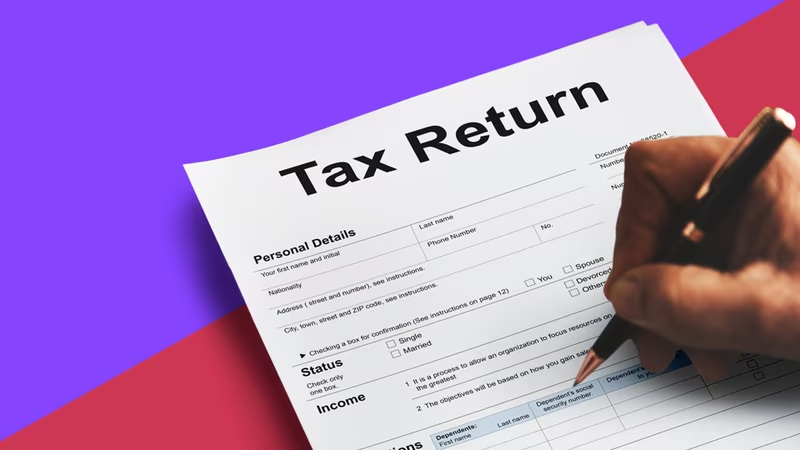You must be aware that if you earn more than a specified amount in a year, you must pay the government the appropriate tax on that income. However, during tax season, most people don't know how to file a tax return and miss the ITR deadline
These returns, also known as ITRs, are an integral part of tax compliance in much the same way as paying your taxes.
The July 31 deadline for submitting an income tax return (ITR) was not extended for this year. According to The Hindu, more than 5.83 crore income tax returns were filed till July 31, with a record of 72.42 lakh on the last day.
But if you're one of the people who hasn't submitted their ITR yet, don't lose heart; you still have time to do so, though there are penalties for submitting it after the deadline. Read on to know all about it:
What Is an Income Tax Return?
A tax return is basically a document that tells the government about your income. If you don't tell the government, you will face penalties and problems later on, as it could turn into tax evasion.
Therefore, all individuals in the tax bracket must file regular tax returns. The Income Tax Service has repeatedly reminded taxpayers of the need to file their ITRs on time.
If a person forgets to submit their ITR, they can be fined up to ₹10,000. In addition, delaying or pausing your tax return also causes you to pay interest on taxable amounts you owe the government.
Read: 8 Personal Financial Strategies to reduce your Tax Liabilities.
Who should file Income Tax Returns?
In order to remain compliant, all taxpayers must timely file their income tax returns. Failure to do so will result in fines and may reduce your ability to obtain a loan, a trip visa, or property registration.
The following entities must voluntarily file ITRs in India in accordance with the Income Tax Act:
1. Individuals with gross annual incomes greater than 2.5 lakhs.
2. Senior citizens with gross annual incomes that exceed 3 lakhs.
3. Senior adults with annual gross incomes of more than 5 lakhs.
4. Regardless of their returns, businesses or firms are required to file ITRs.
5. People who want to get a refund of their income taxes or forward a loss under a certain head of income.
6. Residents who own property or have financial stakes in a company based outside of India.
7. Residents and official representatives in a foreign account.
8. People who receive income from assets or real estate that are owned by a hospital, authority, trust, research association, educational institution, news organisation, infrastructure loan fund, or political party.
9. International companies doing business in India.
10. NRIs who have made over ₹2.5 lakh in India.
Why Do People Need to File Income Tax Returns?
There are many benefits of filing Income Tax Returns.
1. Helps in the acquisition of loans from financial institutions and banks.
2. Required to remain compliant and on the right side of the law.
3. Allows individuals to claim tax refunds as needed.
4. Serves as both proof of income and proof of address.
5. Allows for expedited visa processing and approval.
6. Allows losses to be carried forward.
7. Assists individuals and businesses in avoiding penalties and paying interest on their tax liabilities.
Additional Read: Want to Reduce the Tax Burden? Here is a Comparison of Smart Tax-Saving Investment Options
What would happen if you did not file your ITR by July 31st?
- Section 234F of the Income Tax Act states that individuals with a yearly income of over ₹ 5 lakh who file their ITR by December 31st of the Assessment Year may be subject to a late filing penalty of ₹ 5,000. If the ITR is submitted after December 31st but before March 31st of the assessment year, this amount will increase to ₹10,000.
- On the other hand, Section 234F specifies that anyone whose yearly income is less than ₹ 5 lakh would be charged a late fee of ₹ 1,000.
- According to Section 234A of the Income Tax Act, interest will accrue at the rate of 1 percent per month starting from the due date if an individual fails to file the ITR by the deadline and there is still tax owed.
- A person having taxable income who fails to file an ITR or understates their income on their returns is subject to a fine equal to 50% of the entire tax due on the income for which the return was not filed. That’s because the income tax authorities will assume that the reason for not filing a tax return was tax evasion.
- Due to the failure to file the tax return by the deadlines specified, the taxpayer would not be able to take advantage of some deductions, set off, or carry forward losses other than losses on house property.
- The delinquent taxpayer may also be prosecuted by the authorities under Section 276CC, which, depending on the amount of tax evaded, might result in a strict jail sentence of at least three months and up to two years, as well as a fine.
Also Read: Got a Refund this ITR? Here’s 5 Ways You can Use this Money Smartly!










